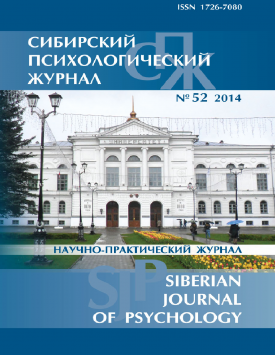Consideration of heuristics of marginality in psycho-corrective work with people convicted for extremism: an anthropological approach
Growing extremalization of younger generation leads to an increase ethnic tensions, the formation of individual youth subcultures, opposition groups demonstrating extremist attitudes and behavioral practices. In a variety of modern research on the problem of extremism, there is no conceptual unity, the problem of extremism is discussed from different angles, so many causes of this phenomenon were allocated, that its essence is lost, the specificity of it occurrence as well as boundaries of its development are not clear. To understand the phenomenon of extremism from our point of view is necessary to analyze it in line with the anthropological approach and relationship between the concepts of marginality, identity and personality extremist. Application of anthropological approach allows us to consider this issue through the prism of conditions and qualities of human existence, its concreteness and certainty, locality, temporality and historicity of human existence, the possibility of loss and gain of the human essence. In this study we tested the hypothesis that the underlying mechanism of such negative identification results in the specific negativistic cognitive and emotional picture of life of members of extremist formations, becoming more sever in situations of disclosure, condemnation and in circumstances to change attitudes. Consideration of the individuality convicted for extremism through the prism of such integral characteristics as negative identity has revealed special features on the basis of which a classification of convicted people has been suggested: "terrorists with risk motivation", "terrorists with psychopathology" and "exploited terrorists". The study has found that the marginaliza-tion characterizing personality with extremist tendencies in behavior, firstly, has a different structure and level content depending on the cultural-environmental factors and age; secondly, it causes a variety of psychological mechanisms of its occurrence; thirdly, it reveals heuristic psychological factors, the content of which indicates, on the one hand, the genesis of the formation of illegal attitudes, on the other hand, it becomes a factor for successful implementation of preventive and corrective treatment . In the process of psycho-diagnostic and psycho-corrective work it was revealed that the majority of those people convicted for extremism (cluster with risk motivation) are in a dire need of spiritual self-determination, which results in deprivation in society, mythologization, arahaization, arhetypization and irrationality of subconscious structures of a psychic and exceeding their individual self, that is - transcendentivity. The data we gained allowed us not only develop and implement psycho-correctional program aimed at preventing recidivism, but also determine the main directions of preventive work with the problems of marginality, negative identity and extremism among young people.
Keywords
экстремизм, маргинальная антропология, негативная идентичность, личность экстремиста, психокоррекция, extremism, marginal anthropology, negative identity, personality extremist psy-chocorrectionAuthors
| Name | Organization | |
| Meshcheryakova Emma I. | Tomsk State University | mei22@mail.ru |
| Bohan Tatyana G. | Tomsk State University | btg960@sibmail.com |
| Larionova Anastasia V. | Tomsk State University | pavlovaa13@mail.ru |
References

Consideration of heuristics of marginality in psycho-corrective work with people convicted for extremism: an anthropological approach | Sibirskiy Psikhologicheskiy Zhurnal – Siberian Journal of Psychology. 2014. № 52.
